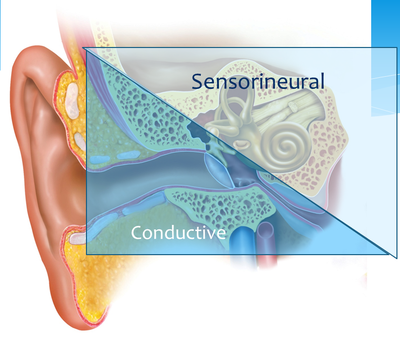Understanding Hearing Loss
Signs of Hearing Loss
If you experience any of the following, consider making an appointment with an audiologist.
- You feel like you can hear, but cannot understand.
- You have difficulty following the conversation with two or more people talking at the same time.
- The people you talk to seem to mumble or not speak clearly.
- Others complain that you turn the TV volume up too high.
- You have trouble hearing in a noisy background or restaurants.
- You have ringing or buzzing in your ears.
- You find yourself asking people to repeat themselves, or respond inappropriately.
- Your family or co-workers remark that you miss what has been said.
- You have trouble understanding the speech of women and children.
- People get annoyed because you misunderstand what they say.
Types of Hearing Loss
Conductive Hearing Loss
Conductive hearing loss occurs from a blockage or mechanical breakdown in the transmission of sound through the auditory system. The underlying organ of hearing, the cochlea, is normal, but the sound cannot reach it. Something as simple as a buildup of ear wax can cut off sound and create a temporary conductive hearing loss. Other causes can be more serious, such as an ear infection or various types of middle ear disorders (otosclerosis, mastoiditis, etc.). In most cases, a conductive hearing loss can be treated with medicine or surgery. Conductive hearing loss accounts for about five to 15 percent of all hearing loss.

Sensorineural Hearing Loss
Sensorineural hearing loss occurs from damage to the inner ear (cochlea) or the nerve pathways to the brain. This type of hearing loss cannot be medically or surgically corrected. Causes of sensorineural hearing loss include:
- Ototoxic drugs
- Genetic inheritance
- Congenital malformation of the inner ear
- Exposure to loud noise
- Aging – called Presbycusis
Most sensorineural hearing losses affect the high frequencies, which in turn can impact speech understanding. The best treatment for sensorineural hearing loss is hearing aids, which improve audibility of speech sounds (usually consonants like “S” and “F”). For hearing aids to be effective, it is important that they are programmed using best practice and are fit in the context of a patient-centered rehabilitative plan. For very severe sensorineural hearing losses, a cochlear implant may be more beneficial as it uses and electrode array to stimulate the auditory nerve directly.
Mixed Hearing Loss
Mixed hearing loss occurs if you have both conductive and sensorineural hearing loss. Having hearing loss from years of target shooting (sensorineural) with an ear infection (conductive) is an example of mixed hearing loss.